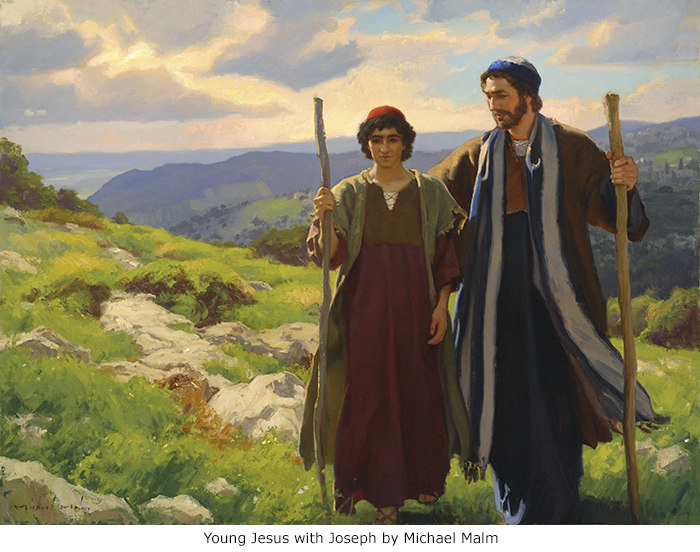
About Joseph
Joseph, the human father of Jesus (Joshua ben Joseph), was a Hebrew of the Hebrews, albeit he carried many non-Jewish racial strains which had been added to his ancestral tree from time to time by the female lines of his progenitors. The ancestry of the father of Jesus went back to the days of Abraham and through this venerable patriarch to the earlier lines of inheritance leading to the Sumerians and Nodites and, through the southern tribes of the ancient blue man, to Andon and Fonta. David and Solomon were not in the direct line of Joseph's ancestry, neither did Joseph's lineage go directly back to Adam. Joseph's immediate ancestors were mechanics—builders, carpenters, masons, and smiths. Joseph himself was a carpenter and later a contractor. His family belonged to a long and illustrious line of the nobility of the common people, accentuated ever and anon by the appearance of unusual individuals who had distinguished themselves in connection with the evolution of religion on Urantia. ~ The Urantia Book, (122:1.1)
Joseph was a mild- mannered man, extremely conscientious, and in every way faithful to the religious conventions and practices of his people. He talked little but thought much. The sorry plight of the Jewish people caused Joseph much sadness. As a youth, among his eight brothers and sisters, he had been more cheerful, but in the earlier years of married life (during Jesus' childhood) he was subject to periods of mild spiritual discouragement. These temperamental manifestations were greatly improved just before his untimely death and after the economic condition of his family had been enhanced by his advancement from the rank of carpenter to the role of a prosperous contractor. ~ The Urantia Book, (122:5.1)
Jesus derived much of his unusual gentleness and marvelous sympathetic understanding of human nature from his father...In emotional reactions to his adult-life environment, Jesus was at one time like his father, meditative and worshipful, sometimes characterized by apparent sadness; but more often he drove forward in the manner of his mother's optimistic and determined disposition.
From Joseph Jesus secured his strict training in the usages of the Jewish ceremonials and his unusual acquaintance with the Hebrew scriptures; from Mary he derived a broader viewpoint of religious life and a more liberal concept of personal spiritual freedom.
The families of both Joseph and Mary were well educated for their time. Joseph and Mary were educated far above the average for their day and station in life. He was a thinker; she was a planner, expert in adaptation and practical in immediate execution. Joseph was a black-eyed brunet; Mary, a brown-eyed well-nigh blond type. ~ The Urantia Book, (122:5.3)
Had Joseph lived, he undoubtedly would have become a firm believer in the divine mission of his eldest son. Mary alternated between believing and doubting, being greatly influenced by the position taken by her other children and by her friends and relatives, but always was she steadied in her final attitude by the memory of Gabriel's appearance to her immediately after the child was conceived. ~ The Urantia Book, (122:5.6)
 Joseph's Dream
Joseph's Dream
Joseph did not become reconciled to the idea that Mary was to become the mother of an extraordinary child until after he had experienced a very impressive dream. In this dream a brilliant celestial messenger appeared to him and, among other things, said: "Joseph, I appear by command of him who now reigns on high, and I am directed to instruct you concerning the son whom Mary shall bear, and who shall become a great light in the world. In him will be life, and his life shall become the light of mankind. He shall first come to his own people, but they will hardly receive him; but to as many as shall receive him to them will he reveal that they are the children of God." After this experience Joseph never again wholly doubted Mary's story of Gabriel's visit and of the promise that the unborn child was to become a divine messenger to the world.
In all these visitations nothing was said about the house of David. Nothing was ever intimated about Jesus' becoming a "deliverer of the Jews," not even that he was to be the long-expected Messiah. Jesus was not such a Messiah as the Jews had anticipated, but he was the world's deliverer. His mission was to all races and peoples, not to any one group.
Joseph was not of the line of King David. Mary had more of the Davidic ancestry than Joseph. True, Joseph did go to the City of David, Bethlehem, to be registered for the Roman census, but that was because, six generations previously, Joseph's paternal ancestor of that generation, being an orphan, was adopted by one Zadoc, who was a direct descendant of David; hence was Joseph also accounted as of the "house of David." ~ The Urantia Book, (122:4.1)
How Joseph Met Mary
When Joseph was a young man, he was employed by Mary's father in the work of building an addition to his house, and it was when Mary brought Joseph a cup of water, during a noontime meal, that the courtship of the pair who were destined to become the parents of Jesus really began.
 Joseph and Mary were married, in accordance with Jewish custom, at Mary's home in the environs of Nazareth when Joseph was twenty-one years old. This marriage concluded a normal courtship of almost two years' duration. Shortly thereafter they moved into their new home in Nazareth, which had been built by Joseph with the assistance of two of his brothers. The house was located near the foot of the near- by elevated land which so charmingly overlooked the surrounding countryside. In this home, especially prepared, these young and expectant parents had thought to welcome the child of promise, little realizing that this momentous event of a universe was to transpire while they would be absent from home in Bethlehem of Judea.
Joseph and Mary were married, in accordance with Jewish custom, at Mary's home in the environs of Nazareth when Joseph was twenty-one years old. This marriage concluded a normal courtship of almost two years' duration. Shortly thereafter they moved into their new home in Nazareth, which had been built by Joseph with the assistance of two of his brothers. The house was located near the foot of the near- by elevated land which so charmingly overlooked the surrounding countryside. In this home, especially prepared, these young and expectant parents had thought to welcome the child of promise, little realizing that this momentous event of a universe was to transpire while they would be absent from home in Bethlehem of Judea.
The larger part of Joseph's family became believers in the teachings of Jesus, but very few of Mary's people ever believed in him until after he departed from this world. Joseph leaned more toward the spiritual concept of the expected Messiah, but Mary and her family, especially her father, held to the idea of the Messiah as a temporal deliverer and political ruler
Joseph held vigorously to the Eastern, or Babylonian, views of the Jewish religion; Mary leaned strongly toward the more liberal and broader Western, or Hellenistic, interpretation of the law and the prophets. ~ The Urantia Book, (122:5.8)
The Home of Joseph, Mary And Jesus
The home of Joseph and Mary was a one-room stone structure with a flat roof and an adjoining building for housing the animals. The furniture consisted of a low stone table, earthenware and stone dishes and pots, a loom, a lampstand, several small stools, and mats for sleeping on the stone floor. In the back yard, near the animal annex, was the shelter which covered the oven and the mill for grinding grain. It required two persons to operate this type of mill, one to grind and another to feed the grain. As a small boy Jesus often fed grain to this mill while his mother turned the grinder.
In later years, as the family grew in size, they would all squat about the enlarged stone table to enjoy their meals, helping themselves from a common dish, or pot, of food. During the winter, at the evening meal the table would be lighted by a small, flat clay lamp, which was filled with olive oil. After the birth of Martha, Joseph built an addition to this house, a large room, which was used as a carpenter shop during the day and as a sleeping room at night. ~ The Urantia Book, (122:6.2)
Joseph and the Trip to Bethlehem for the Census
In the month of March, 8 B.C. (the month Joseph and Mary were married), Caesar Augustus decreed that all inhabitants of the Roman Empire should be numbered, that a census should be made which could be used for effecting better taxation. The Jews had always been greatly prejudiced against any attempt to "number the people," and this, in connection with the serious domestic difficulties of Herod, King of Judea, had conspired to cause the postponement of the taking of this census in the Jewish kingdom for one year. Throughout all the Roman Empire this census was registered in the year 8 B.C., except in the Palestinian kingdom of Herod, where it was taken in 7 B.C., one year later. ~ The Urantia Book, (122:7.1)
Joseph virtually forbade Mary to accompany him, but it was of no avail; when the food was packed for the trip of three or four days, she prepared double rations and made ready for the journey. But before they actually set forth, Joseph was reconciled to Mary's going along, and they cheerfully departed from Nazareth at the break of day.
Joseph and Mary were poor, and since they had only one beast of burden, Mary, being large with child, rode on the animal with the provisions while Joseph walked, leading the beast. The building and furnishing of a home had been a great drain on Joseph since he had also to contribute to the support of his parents, as his father had been recently disabled. And so this Jewish couple went forth from their humble home early on the morning of August 18, 7 B.C., on their journey to Bethlehem. ~ The Urantia Book, (122:7.3)
The inn was overcrowded, and Joseph accordingly sought lodgings with distant relatives, but every room in Bethlehem was filled to overflowing. On returning to the courtyard of the inn, he was informed that the caravan stables, hewn out of the side of the rock and situated just below the inn, had been cleared of animals and cleaned up for the reception of lodgers. Leaving the donkey in the courtyard, Joseph shouldered their bags of clothing and provisions and with Mary descended the stone steps to their lodgings below. They found themselves located in what had been a grain storage room to the front of the stalls and mangers. Tent curtains had been hung, and they counted themselves fortunate to have such comfortable quarters.
Joseph had thought to go out at once and enroll, but Mary was weary; she was considerably distressed and besought him to remain by her side, which he did. ~ The Urantia Book, (122:7.7)
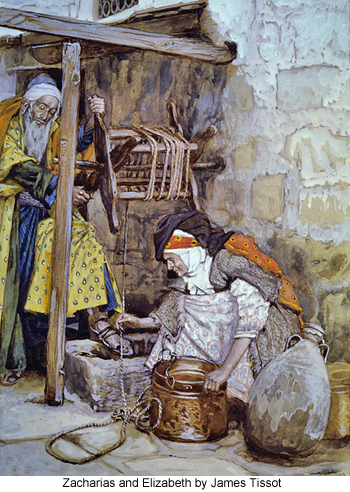 Joseph After Jesus' Birth
Joseph After Jesus' Birth
The next day after the birth of Jesus, Joseph made his enrollment. Meeting a man they had talked with two nights previously at Jericho, Joseph was taken by him to a well-to-do friend who had a room at the inn, and who said he would gladly exchange quarters with the Nazareth couple. That afternoon they moved up to the inn, where they lived for almost three weeks until they found lodgings in the home of a distant relative of Joseph.
The second day after the birth of Jesus, Mary sent word to Elizabeth that her child had come and received word in return inviting Joseph up to Jerusalem to talk over all their affairs with Zacharias. The following week Joseph went to Jerusalem to confer with Zacharias. Both Zacharias and Elizabeth had become possessed with the sincere conviction that Jesus was indeed to become the Jewish deliverer, the Messiah, and that their son John was to be his chief of aides, his right-hand man of destiny. And since Mary held these same ideas, it was not difficult to prevail upon Joseph to remain in Bethlehem, the City of David, so that Jesus might grow up to become the successor of David on the throne of all Israel. Accordingly, they remained in Bethlehem more than a year, Joseph meantime working some at his carpenter's trade. ~ The Urantia Book, (122:8.3)
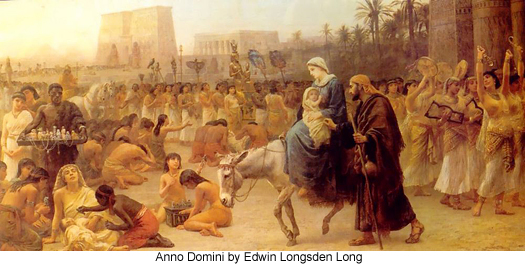 Joseph takes Mary and Jesus to Egypt in Fear of Herod
Joseph takes Mary and Jesus to Egypt in Fear of Herod
Joseph was afraid to seek work, and their small savings were rapidly disappearing. Even at the time of the purification ceremonies at the temple, Joseph deemed himself sufficiently poor to warrant his offering for Mary two young pigeons as Moses had directed for the purification of mothers among the poor. ~ The Urantia Book, (122:10.2)
[A member of Herod's court, who was a believer] learning of the order to slaughter the Bethlehem boy babies, communicated with Zacharias, who in turn dispatched a messenger to Joseph; and the night before the massacre Joseph and Mary departed from Bethlehem with the babe for Alexandria in Egypt. In order to avoid attracting attention, they journeyed alone to Egypt with Jesus. They went to Alexandria on funds provided by Zacharias, and there Joseph worked at his trade while Mary and Jesus lodged with well-to-do relatives of Joseph's family. They sojourned in Alexandria two full years, not returning to Bethlehem until after the death of Herod. ~ The Urantia Book, (122:10.4)
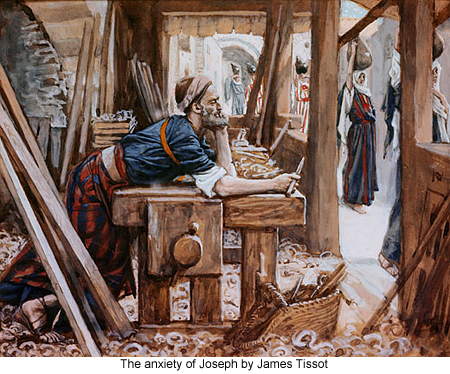 Joseph and the Early Childhood of Jesus
Joseph and the Early Childhood of Jesus
OWING TO THE uncertainties and anxieties of their sojourn in Bethlehem, Mary did not wean the babe until they had arrived safely in Alexandria, where the family was able to settle down to a normal life. They lived with kinsfolk, and Joseph was well able to support his family as he secured work shortly after their arrival. He was employed as a carpenter for several months and then elevated to the position of foreman of a large group of workmen employed on one of the public buildings then in process of construction. This new experience gave him the idea of becoming a contractor and builder after their return to Nazareth.
Mary had never fully given up the idea that Jesus ought to grow up in Bethlehem, the City of David. Joseph did not really believe that their son was to become a kingly deliverer of Israel. Besides, he knew that he himself was not really a descendant of David; that his being reckoned among the offspring of David was due to the adoption of one of his ancestors into the Davidic line of descent. Mary, of course, thought the City of David the most appropriate place in which the new candidate for David's throne could be reared, but Joseph preferred to take chances with Herod Antipas rather than with his brother Archelaus. He entertained great fears for the child's safety in Bethlehem or in any other city in Judea, and surmised that Archelaus would be more likely to pursue the menacing policies of his father, Herod, than would Antipas in Galilee. And besides all these reasons, Joseph was outspoken in his preference for Galilee as a better place in which to rear and educate the child, but it required three weeks to overcome Mary's objections.
By the first of October Joseph had convinced Mary and all their friends that it was best for them to return to Nazareth. Accordingly, early in October, 4 B.C., they departed from Bethlehem for Nazareth, going by way of Lydda and Scythopolis. They started out early one Sunday morning, Mary and the child riding on their newly acquired beast of burden, while Joseph and five accompanying kinsmen proceeded on foot; Joseph's relatives refused to permit them to make the trip to Nazareth alone. They feared to go to Galilee by Jerusalem and the Jordan valley, and the western routes were not altogether safe for two lone travelers with a child of tender years. ~ The Urantia Book, (123:0.4)
Back in Nazareth
On the fourth day of the journey the party reached its destination in safety. They arrived unannounced at the Nazareth home, which had been occupied for more than three years by one of Joseph's married brothers, who was indeed surprised to see them; so quietly had they gone about their business that neither the family of Joseph nor that of Mary knew they had even left Alexandria. The next day Joseph's brother moved his family, and Mary, for the first time since Jesus' birth, settled down with her little family to enjoy life in their own home. In less than a week Joseph secured work as a carpenter, and they were supremely happy. ~ The Urantia Book, (123:1.1)
On the way to Nazareth Joseph had persuaded Mary that it would be unwise to spread the word among their Galilean friends and relatives that Jesus was a child of promise. They agreed to refrain from all mention of these matters to anyone. And they were both very faithful in keeping this promise. ~ The Urantia Book, (123:1.3)
It was midsummer of this same year that Joseph built a small workshop close to the village spring and near the caravan tarrying lot. After this he did very little carpenter work by the day. He had as associates two of his brothers and several other mechanics, whom he sent out to work while he remained at the shop making yokes and plows and doing other woodwork. He also did some work in leather and with rope and canvas. And Jesus, as he grew up, when not at school, spent his time about equally between helping his mother with home duties and watching his father work at the shop, meanwhile listening to the conversation and gossip of the caravan conductors and passengers from the four corners of the earth. ~ The Urantia Book, (123:1.6)
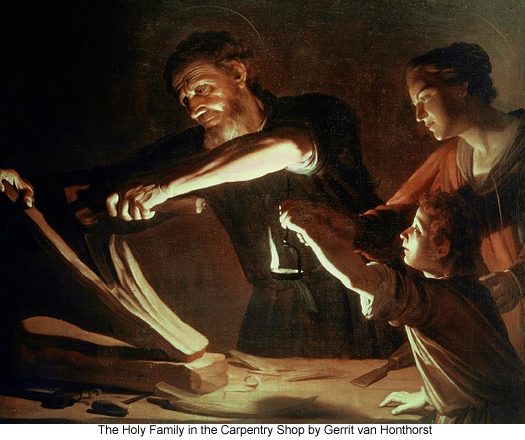 Joseph and Jesus' Fifth Year
Joseph and Jesus' Fifth Year
Joseph never failed to do his full duty in taking pains and spending time answering the boy's numerous questions. From the time Jesus was five years old until he was ten, he was one continuous question mark. While Joseph and Mary could not always answer his questions, they never failed fully to discuss his inquiries and in every other possible way to assist him in his efforts to reach a satisfactory solution of the problem which his alert mind had suggested.
Since returning to Nazareth, theirs had been a busy household, and Joseph had been unusually occupied building his new shop and getting his business started again. So fully was he occupied that he had found no time to build a cradle for James, but this was corrected long before Miriam came, so that she had a very comfortable crib in which to nestle while the family admired her. ~ The Urantia Book, (123:2.3)
Joseph During Jesus' Youth
Already, with his mother's help, Jesus had mastered the Galilean dialect of the Aramaic tongue; and now his father began teaching him Greek. Mary spoke little Greek, but Joseph was a fluent speaker of both Aramaic and Greek. The textbook for the study of the Greek language was the copy of the Hebrew scriptures—a complete version of the law and the prophets, including the Psalms —which had been presented to them on leaving Egypt. There were only two complete copies of the Scriptures in Greek in all Nazareth, and the possession of one of them by the carpenter's family made Joseph's home a much- sought place and enabled Jesus, as he grew up, to meet an almost endless procession of earnest students and sincere truth seekers.
The first great shock of Jesus' young life occurred when he was not quite six years old. It had seemed to the lad that his father—at least his father and mother together—knew everything. Imagine, therefore, the surprise of this inquiring child, when he asked his father the cause of a mild earthquake which had just occurred, to hear Joseph say, "My son, I really do not know." Thus began that long and disconcerting disillusionment in the course of which Jesus found out that his earthly parents were not all-wise and all-knowing.
Joseph's first thought was to tell Jesus that the earthquake had been caused by God, but a moment's reflection admonished him that such an answer would immediately be provocative of further and still more embarrassing inquiries. Even at an early age it was very difficult to answer Jesus' questions about physical or social phenomena by thoughtlessly telling him that either God or the devil was responsible. In harmony with the prevailing belief of the Jewish people, Jesus was long willing to accept the doctrine of good spirits and evil spirits as the possible explanation of mental and spiritual phenomena, but he very early became doubtful that such unseen influences were responsible for the physical happenings of the natural world. ~ The Urantia Book, (123:3.1)
During this year Joseph and Mary had trouble with Jesus about his prayers. He insisted on talking to his heavenly Father much as he would talk to Joseph, his earthly father. This departure from the more solemn and reverent modes of communication with Deity was a bit disconcerting to his parents, especially to his mother, but there was no persuading him to change; he would say his prayers just as he had been taught, after which he insisted on having "just a little talk with my Father in heaven."
In June of this year Joseph turned the shop in Nazareth over to his brothers and formally entered upon his work as a builder. Before the year was over, the family income had more than trebled. Never again, until after Joseph's death, did the Nazareth family feel the pinch of poverty. The family grew larger and larger, and they spent much money on extra education and travel, but always Joseph's increasing income kept pace with the growing expenses.
The next few years Joseph did considerable work at Cana, Bethlehem (of Galilee), Magdala, Nain, Sepphoris, Capernaum, and Endor, as well as much building in and near Nazareth. As James grew up to be old enough to help his mother with the housework and care of the younger children, Jesus made frequent trips away from home with his father to these surrounding towns and villages.
In many ways...Joseph exerted the greater control over Jesus as it was his practice to sit down with the boy and fully explain the real and underlying reasons for the necessity of disciplinary curtailment of personal desires in deference to the welfare and tranquillity of the entire family. When the situation had been explained to Jesus, he was always intelligently and willingly co-operative with parental wishes and family regulations. ~ The Urantia Book, (123:3.6)
Jesus Has an Accident
The only real accident Jesus had up to this time was a fall down the back-yard stone stairs which led up to the canvas-roofed bedroom. It happened during an unexpected July sandstorm from the east. The hot winds, carrying blasts of fine sand, usually blew during the rainy season, especially in March and April. It was extraordinary to have such a storm in July. When the storm came up, Jesus was on the housetop playing, as was his habit, for during much of the dry season this was his accustomed playroom. He was blinded by the sand when descending the stairs and fell. After this accident Joseph built a balustrade up both sides of the stairway. ~ The Urantia Book, (123:4.5)
Jesus and Joseph Take Walks Together
Nazareth was one of the twenty- four priest centers of the Hebrew nation. But the Galilean priesthood was more liberal in the interpretation of the traditional laws than were the Judean scribes and rabbis. And at Nazareth they were also more liberal regarding the observance of the Sabbath. It was therefore the custom for Joseph to take Jesus out for walks on Sabbath afternoons, one of their favorite jaunts being to climb the high hill near their home, from which they could obtain a panoramic view of all Galilee. To the northwest, on clear days, they could see the long ridge of Mount Carmel running down to the sea; and many times Jesus heard his father relate the story of Elijah, one of the first of that long line of Hebrew prophets, who reproved Ahab and exposed the priests of Baal. To the north Mount Hermon raised its snowy peak in majestic splendor and monopolized the skyline, almost 3,000 feet of the upper slopes glistening white with perpetual snow. Far to the east they could discern the Jordan valley and far beyond the rocky hills of Moab Also to the south and the east, when the sun shone upon their marble walls, they could see the Greco-Roman cities of the Decapolis, with their amphitheaters and pretentious temples. And when they lingered toward the going down of the sun, to the west they could make out the sailing vessels on the distant Mediterranean. ~ The Urantia Book, (123:5.12)
Joseph Decides Against Jesus Going Away to School
In February, Nahor, one of the teachers in a Jerusalem academy of the rabbis, came to Nazareth to observe Jesus, having been on a similar mission to Zacharias's home near Jerusalem. He came to Nazareth at the instigation of John's father. While at first he was somewhat shocked by Jesus' frankness and unconventional manner of relating himself to things religious, he attributed it to the remoteness of Galilee from the centers of Hebrew learning and culture and advised Joseph and Mary to allow him to take Jesus back with him to Jerusalem, where he could have the advantages of education and training at the center of Jewish culture. Mary was half persuaded to consent; she was convinced her eldest son was to become the Messiah, the Jewish deliverer; Joseph hesitated; he was equally persuaded that Jesus was to grow up to become a man of destiny, but what that destiny would prove to be he was profoundly uncertain. But he never really doubted that his son was to fulfill some great mission on earth. The more he thought about Nahor's advice, the more he questioned the wisdom of the proposed sojourn in Jerusalem. ~ The Urantia Book, (123:6.8)
Joseph Forbids Jesus To Express His Artistic Side
Mary endeavored to influence Joseph to permit Jesus to model in clay at home, provided he promised not to carry on any of these questionable activities at school, but Joseph felt impelled to rule that the rabbinical interpretation of the second commandment should prevail. And so Jesus no more drew or modeled the likeness of anything from that day as long as he lived in his father's house. But he was unconvinced of the wrong of what he had done, and to give up such a favorite pastime constituted one of the great trials of his young life. ~ The Urantia Book, (124:1.5)
Joseph Adds Another Addition to the Home
Jesus' second sister, Martha, was born Thursday night, September 13. Three weeks after the coming of Martha, Joseph, who was home for awhile, started the building of an addition to their house, a combined workshop and bedroom. A small workbench was built for Jesus, and for the first time he possessed tools of his own. At odd times for many years he worked at this bench and became highly expert in the making of yokes. ~ The Urantia Book, (124:1.7)
Jesus Confides in Joseph
It was the fifth of July, the first Sabbath of the month, when Jesus, while strolling through the countryside with his father, first gave expression to feelings and ideas which indicated that he was becoming self-conscious of the unusual nature of his life mission. Joseph listened attentively to the momentous words of his son but made few comments; he volunteered no information. ~ The Urantia Book, (124:2.1)
Joseph early began to instruct Jesus in the diverse means of gaining a livelihood, explaining the advantages of agriculture over industry and trade. Galilee was a more beautiful and prosperous district than Judea, and it cost only about one fourth as much to live there as in Jerusalem and Judea. It was a province of agricultural villages and thriving industrial cities, containing more than two hundred towns of over five thousand population and thirty of over fifteen thousand. ~ The Urantia Book, (124:2.9)
Jesus and Joseph Have a Serious Conflict
About the middle of May the lad accompanied his father on a business trip to Scythopolis, the chief Greek city of the Decapolis, the ancient Hebrew city of Beth-shean. On the way Joseph recounted much of the olden history of King Saul, the Philistines and the subsequent events of Israel's turbulent history. Jesus was tremendously impressed with the clean appearance and well-ordered arrangement of this so-called heathen city. He marveled at the open-air theater and admired the beautiful marble temple dedicated to the worship of the "heathen" gods. Joseph was much perturbed by the lad's enthusiasm and sought to counteract these favorable impressions by extolling the beauty and grandeur of the Jewish temple at Jerusalem. Jesus had often gazed curiously upon this magnificent Greek city from the hill of Nazareth and had many times inquired about its extensive public works and ornate buildings, but his father had always sought to avoid answering these questions. Now they were face to face with the beauties of this gentile city, and Joseph could not gracefully ignore Jesus' inquiries.
It so happened that just at this time the annual competitive games and public demonstrations of physical prowess between the Greek cities of the Decapolis were in progress at the Scythopolis amphitheater, and Jesus was insistent that his father take him to see the games, and he was so insistent that Joseph hesitated to deny him. The boy was thrilled with the games and entered most heartily into the spirit of the demonstrations of physical development and athletic skill. Joseph was inexpressibly shocked to observe his son's enthusiasm as he beheld these exhibitions of "heathen" vaingloriousness. After the games were finished, Joseph received the surprise of his life when he heard Jesus express his approval of them and suggest that it would be good for the young men of Nazareth if they could be thus benefited by wholesome outdoor physical activities. Joseph talked earnestly and long with Jesus concerning the evil nature of such practices, but he well knew that the lad was unconvinced.
The only time Jesus ever saw his father angry with him was that night in their room at the inn when, in the course of their discussions, the boy so far forgot the trends of Jewish thought as to suggest that they go back home and work for the building of an amphitheater at Nazareth. When Joseph heard his first-born son express such un-Jewish sentiments, he forgot his usual calm demeanor and, seizing Jesus by the shoulder, angrily exclaimed, "My son, never again let me hear you give utterance to such an evil thought as long as you live." Jesus was startled by his father's display of emotion; he had never before been made to feel the personal sting of his father's indignation and was astonished and shocked beyond expression. He only replied, "Very well, my father, it shall be so." And never again did the boy even in the slightest manner allude to the games and other athletic activities of the Greeks as long as his father lived. ~ The Urantia Book, (124:3.6)
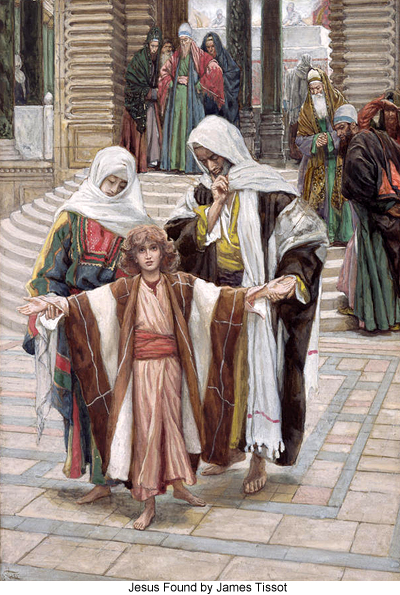 Joseph Yields To Jesus' Logic
Joseph Yields To Jesus' Logic
During his last year at school, when he was twelve years old, Jesus remonstrated with his father about the Jewish custom of touching the bit of parchment nailed upon the doorpost each time on going into, or coming out of, the house and then kissing the finger that touched the parchment. As a part of this ritual it was customary to say, "The Lord shall preserve our going out and our coming in, from this time forth and even forevermore." Joseph and Mary had repeatedly instructed Jesus as to the reasons for not making images or drawing pictures, explaining that such creations might be used for idolatrous purposes. Though Jesus failed fully to grasp their proscriptions against images and pictures, he possessed a high concept of consistency and therefore pointed out to his father the essentially idolatrous nature of this habitual obeisance to the doorpost parchment. And Joseph removed the parchment after Jesus had thus remonstrated with him. ~ The Urantia Book, (124:4.7)
During the Trip to Jerusalem
While all Jerusalem was astir in preparation for the Passover, Joseph found time to take his son around to visit the academy where it had been arranged for him to resume his education two years later, as soon as he reached the required age of fifteen. Joseph was truly puzzled when he observed how little interest Jesus evinced in all these carefully laid plans. ~ The Urantia Book, (124:6.13)
Upon Finding Jesus in The Temple
Joseph was speechless, but Mary gave vent to her long-pent-up fear and anxiety when, rushing up to the lad, now standing to greet his astonished parents, she said: "My child, why have you treated us like this? It is now more than three days that your father and I have searched for you sorrowing. Whatever possessed you to desert us?" It was a tense moment. All eyes were turned on Jesus to hear what he would say. His father looked reprovingly at him but said nothing. ~ The Urantia Book, (125:6.5)
Joseph Provides for Jesus' Future Education
Early this year Joseph arranged to set aside the income from his Nazareth and Capernaum property to pay for Jesus' long course of study at Jerusalem, it having been planned that he should go to Jerusalem in August of the following year when he would be fifteen years of age. ~ The Urantia Book, (126:1.4)
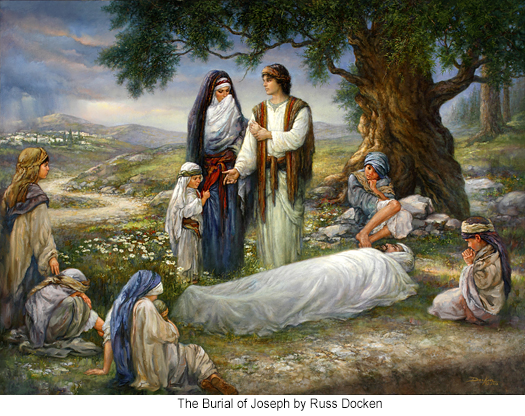 The Death of Joseph
The Death of Joseph
All did go well until that fateful day of Tuesday, September 25, when a runner from Sepphoris brought to this Nazareth home the tragic news that Joseph had been severely injured by the falling of a derrick while at work on the governor's residence. The messenger from Sepphoris had stopped at the shop on the way to Joseph's home, informing Jesus of his father's accident, and they went together to the house to break the sad news to Mary. Jesus desired to go immediately to his father, but Mary would hear to nothing but that she must hasten to her husband's side. She directed that James, then ten years of age, should accompany her to Sepphoris while Jesus remained home with the younger children until she should return, as she did not know how seriously Joseph had been injured. But Joseph died of his injuries before Mary arrived. They brought him to Nazareth, and on the following day he was laid to rest with his fathers. ~ The Urantia Book, (126:2.1)
But in spite of all that Jesus and the Nazareth neighbors could do to bring cheer into the home, Mary, and even the children, were overcast with sadness. Joseph was gone. Joseph was an unusual husband and father, and they all missed him. And it seemed all the more tragic to think that he died ere they could speak to him or hear his farewell blessing. ~ The Urantia Book, (126:2.8)


